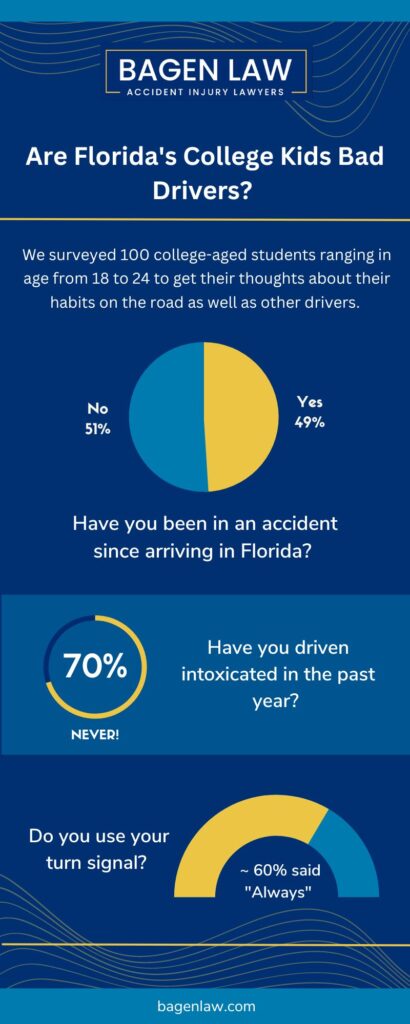Steven A. Bagen | June 28, 2023 | Car Accidents \ Motorcycle accident \ Pedestrian Accidents \ Personal Injury
Are Florida’s College Kids Bad Drivers?
Younger drivers often get a bad reputation as more dangerous than their older counterparts, but are they really more likely to cause an accident? We asked Florida University students to share their experiences on the road.
Florida is home to over 20 college institutions and over half a million students in total. In addition to their academic programs, the state’s higher learning network serves as a hub for employment opportunities, recreation, and community involvement for many.
As concerned drivers, we like to understand the risks on the road so we can exercise better caution and awareness behind the wheel. Pedestrians and bicyclists are also subject to the hazards of distracted and intoxicated drivers, those who disregard traffic laws, and other negligent behaviors that contribute to accidents in Florida every day.
To better understand the relative risk of college-aged drivers, we at Steven A. Bagen and Associates interviewed 100 motorists between the ages of 18 and 24 to see what our young adult population really thinks about their habits on the road.
Key Findings:
- Nearly half of the participants said they were in a car accident since arriving in Florida
- About 70 percent of drivers said they had never driven while intoxicated during the past year
- Only about 60 percent of participants said they always use their turn signals

Most Young Adults Have a Low to Average Opinion of Their Peers’ Driving Abilities
While one might speculate that drivers, in general, would tend to vouch for their own age group, we found that our survey’s participants were less than enthusiastic to give their fellow late teens and early twenties drivers a five-star rating:
- About 3 percent said they considered college drivers in Florida very safe.
- The largest group, slightly over 40 percent, rated college drivers as a whole average.
- The second largest group, nearly 37 percent percent, responded that college drivers were moderately safe.
- Only about 15 percent felt that Florida’s college drivers were not at all safe.

Most Surveyed College-aged Drivers Were in at Least One Accident
Whether it’s a full-on collision with severe bodily injury or a fender bender resulting in little to no damage, an accident always causes concern.
Keeping in mind that our data did not assess whether the respondents were found liable for the accidents they self-reported, most participants claimed to have crashed at some point in Florida.
- Less than 10 percent said that they had a great deal of involvement in accidents within the state
- Slightly fewer participants replied that they were in a lot of accidents.
- About 12 percent claimed a moderate number of accidents.
- The largest group, at slightly less than 40 percent, responded that they were in a few accidents.
- The second-largest group, totaling 35 percent, said they were never in an accident of any kind in Florida.

Car Accidents Still Constitute the Lion’s Share of Traffic Collisions
Many college campuses and universities pride themselves on their ease of transportation — from biking and walking to the use of motorized scooters and motorcycles, college students have no shortage of options to get around.
However, many of us still rely on cars as a primary mode of transport, and depending on where you live, walking and biking may not offer an option to get to work or school.
Having asked about the frequency our survey participants were in accidents, we asked them what vehicles these accidents involved.
- Nearly half of respondents said that they had suffered at least one car accident.
- Slightly over 10 percent were in at least one bicycle accident.
- About 5 percent had suffered at least one pedestrian accident.
- Slightly less than 5 percent had experienced a motorized scooter or Vespa accident.
- About 1 percent had suffered a motorcycle accident.
- The second-largest group responded “other,” meaning that they had either not suffered any accidents or that the vehicles involved in them did not appear on the list.

Most Scooter Riders Report Having No Trouble Controlling Their Vehicles, With Some Exceptions
Younger riders find motorized scooters and mopeds relatively easy to ride and maintain, providing a cost-effective option that combines the sleek profile of a motorcycle without the technical knowledge required to operate a high-power engine.
Florida’s requirements for endorsement will depend on the size of the motor scooter or moped; technically, a moped with a top speed of under 30 miles per hour does not require a motorcycle endorsement. However, a motor scooter with an engine larger than 50cc does require a special license endorsement to operate. In either case, riders or owners must properly register these vehicles.
Due to their lower horsepower, these vehicles can rarely exceed 25 to 60 miles per hour, making them inappropriate for highway use.
However, just because a scooter is smaller and slower than a larger vehicle does not make it safer. In fact, the same precautions that apply to motorcyclists apply to riding a moped.
Leading two-wheeled vehicle organizations recommend that moped riders wear protective clothing and DOT-approved helmets that decrease visibility as little as possible. Riders must also take care to learn proper handling and defensive driving when operating them.
We asked our moped-riding participants to tell us if and how often they felt they had lost control of their scooters while riding.
- Slightly over 10 percent reported that such incidents had occurred under 10 times.
- Around 8 percent said that they had lost control more than 10 times.
- Concerningly, slightly more than 5 percent responded that this had happened “more times than you can imagine.”
- Most respondents, slightly less than 75 percent, assured us that they had never lost control of their scooter or moped.

Scooter Riders Driving Inattentively Place Pedestrians at Risk
A scooter rider must remain attentive and aware of their surroundings, including pedestrians. In Florida, motorized scooters and mopeds may not operate on sidewalks or bicycle paths. However, some riders do so unlawfully, creating an increased risk of pedestrian and bicycle accidents.
We asked our survey respondents how often they’d had a close call with a pedestrian while operating a motorized scooter.
- The vast majority of respondents, around 75 percent, responded that they had never had a near-accident with a pedestrian while operating a moped.
- The remaining 25 percent of participants said that they had indeed experienced a close call involving a pedestrian.
This data does not account for the total number of participants who habitually ride a motorized scooter, nor does it tell us how much experience they have with these vehicles or where they occurred. However, the fact that a quarter of those who answered admitted to having close brushes with pedestrians is enough to give us pause and recommend that those who currently ride or want to purchase a moped or scooter take the proper safety precautions.

Many Drivers Believe They Don’t Need to Report a Scooter Accident
We found a lax attitude regarding accident reporting seemed surprisingly prevalent among our survey respondents.
- Over 35 percent said they would choose not to report an accident on a motor scooter or moped.
- The remaining 65 percent said that they would report these accidents.

Driving Under the Influence of Alcohol: Is it Less Dangerous on a Scooter?
Almost everyone would acknowledge the well-proven dangers of drinking and driving. In just one year alone, alcohol contributed to over 5,000 crashes in Florida.
That the risk of accidents and injuries increases substantially after even just one drink is well-documented. However, popular opinion regarding whether it’s safe to operate a smaller vehicle, such as a motor scooter, often tends to overlook these realities.
We asked our respondents whether they would operate a motorized scooter while drinking because it seems safer than driving a car.
- Over a quarter of respondents said that they agreed that riding a scooter while drinking seemed safer.
- The remainder, over 70 percent, said they disagreed.

Most Choose Not to Drink and Drive, but Those Who Do, Do so Frequently
We know that statistically, those between the ages of 21 and 34 tend to drive drunk more often than those in other age groups and more males than females drive while intoxicated. However, accidents involving drunk drivers are still a leading cause of death in teens, and many of these accidents involve teenage and college-aged drivers.
Among our survey participants, we found that most claimed responsible behavior, choosing not to drive while even mildly intoxicated.
However, concerning those who did admit to drinking and driving, the frequency of this behavior may surprise you.
- Nearly 70 percent of respondents said that, during the past year, they had never driven while buzzed.
- About 12 percent said that they had driven while mildly intoxicated less than 10 times.
- Slightly more than 10 percent admitted to driving while somewhat inebriated more than 10 times.
- About 5 percent said that they had engaged in this behavior “more times than I can remember.”

When It Comes to Using the Blinker, Good Habits Aren’t the Norm
To round out our questionnaire, we asked our survey participants about how often they use their turn signals while driving.
While a responsible driver must incorporate many behaviors, patterns, and general respect for others, using one’s turn signal is an important part of any good motorist’s duty to share the road safely.
- Nearly 60 percent responded that they always use their blinkers.
- About 28 percent said that they usually do so, but not always.
- About 8 percent reported sometimes using their vehicles’ turn signals.
- About 2 percent admitted to never using the blinker.
- Less than 1 percent said that they rarely do so.


Everyone, Including Younger Drivers, Must Drive Safely and Promote Awareness
Information about driver safety and accidents across various ages and demographics can help us understand the risks and trends on Florida roads.
However, these statistics cannot give us a complete picture of how accidents affect every person involved. Every accident is unique and comes with unique losses and challenges. As drivers, we owe each other a duty to remain educated and aware and promote safety on our roads.
After a car, motorcycle, or pedestrian accident, reach out to the personal injury attorneys at Steven A. Bagen and Associates for your free consultation and discuss your legal matter today.
